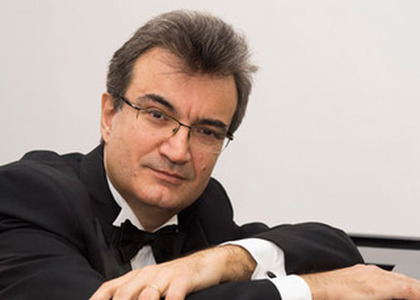> Interviews

Interview with Vlad Dimulescu
This Sunday's recital is dedicated to the memory of pianist and professor Constantin Ionescu-Vovu. What did this personality of Romanian music mean to you?
Constantin Ionescu-Vovu meant a lot to me and my colleagues. He is part of one of the leading piano schools in Romania. He was a pupil of Mrs. Silvia Șerbescu, from my point of view the greatest Romanian pianist, who, in turn, was a pupil of Alfred Cortot. As a pianist, I trained and evolved as a student under his guidance. As a musician, it meant even more.
The program includes works by Frédéric Chopin and Claude Debussy. What prompted the choice of this repertoire? Is there a connection between the chosen works and the pianist Constantin Ionescu-Vovu?
Alfred Cortot remains one of the great interpreters, he was also Dinu Lipatti's mentor, so you realize that Frédéric Chopin meant a lot to my master as well. My choice is because Debussy continues, in Impressionism, the line of Chopin, as Ravel goes along the line of Liszt. From my point of view, Chopin represents a sound ideal, belcanto. In my evolution as a pianist there have been some important moments related to the memory of Frédéric Chopin and Dinu Lipatti. Here I can mention a recital I had some time ago at ¯elazowa Wola, where Chopin was born, and a recital at Besançon, in memory of the great pianist Dinu Lipatti, with works also by Chopin, which Dinu Lipatti performed in his last recital.
On stage you will go up with pianist Racz Aladar, a disciple of the same teacher, and play The Little Suite for Four Hands by Claude Debussy. How did this collaboration arise and how did the preparation of this recital go?
I have known Racz Aladar since we were students. This is the first time we will perform together on the stage of the Romanian Athenaeum, so it will be a novelty for us and for the public.
You are also a teacher and train new generations of pianists. What did you take from the pedagogical style of Maestro Ionescu-Vovu and do you feel that you pass on?
I do not think that this interview is enough to discuss the many aspects of the pedagogical school that I have tried to understand. First of all, the love for music, the definition of a good musical phrasing, the musical interpretation and a specific thinking of the pianist, in terms of the artistic act. These would be milestones. Moreover, the individual study with each student and the permanent desire to share as an older brother everything I have learned and all the repertoire I have gone through; and these things I have learned from Master Constantin Ionescu-Vovu.
Finally, what would you like the audience to feel during this recital and what message would you like them to convey to listeners who have not had the opportunity to meet pianist Constantin Ionescu-Vovu?
Constantin Ionescu-Vovu was a monument of culture. First of all, it had varied approaches, styles. He did not stop at a composer or just at the piano part of his thinking. I hope that this recital will include several artistic, aesthetic landmarks and will be an offering to his interpretative art. I hope that the master will remain in the memory and heart of the listeners, that they will remember him every time we sing each of us for our great mentor.
Translated by Darius Baciu,
University of Bucharest, Faculty of Foreign Languages and Literatures, MTTLC, year I
Corrected by Silvia Petrescu














